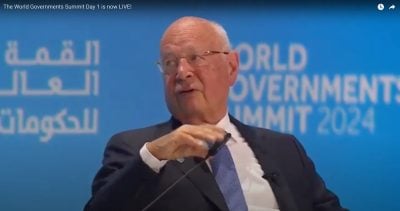WEF Chairman Klaus Schwab Now Wants a “Humanocracy” Instead of a Technocracy

All Global Research articles can be read in 51 languages by activating the Translate Website button below the author’s name (only available in desktop version).
To receive Global Research’s Daily Newsletter (selected articles), click here.
Click the share button above to email/forward this article to your friends and colleagues. Follow us on Instagram and Twitter and subscribe to our Telegram Channel. Feel free to repost and share widely Global Research articles.
Big Tech’s Effort to Silence Truth-tellers: Global Research Online Referral Campaign
***
World Economic Forum’s chairman Klaus Schwab recently said at World Governments Summit in Dubai that we should avoid a technocratic bureaucracy and instead create a “humanocracy”. A world where technology is used to create a “better world” with the help from “technicians, philosophers and humanists”. Klaus now seems to view himself as a benevolent humanist.
So how will his “human society” look like? During the subsequent conversation with the chairman of the WGS, Mohammad Al Gergawi, Schwab said:
And finally I think we have to be prepared for a world where we see a fusion of our physical, our digital and our biological dimensions.
This attempt to rebrand his techno-futurist cult into a “humanocracy” can only be described as pathetic.
One of the chapters in his manual for large scale transformation of humanity and the earth system, Shaping the Future of the Fourth Industrial Revolution, has the revealing title “Altering the Human”. It seems that Klaus just happened to forget to add “trans” before “humanist”.
I say his visions for the future more resemble a Robotocracy. With a humanity transformed into cyborgs, guided and monitored by the “All-seeing Eye” (AI).
*
Note to readers: Please click the share button above. Follow us on Instagram and Twitter and subscribe to our Telegram Channel. Feel free to repost and share widely Global Research articles.
Featured image is a screenshot from Youtube
This article has been archived for your research. The original version from Global Research can be found here.


